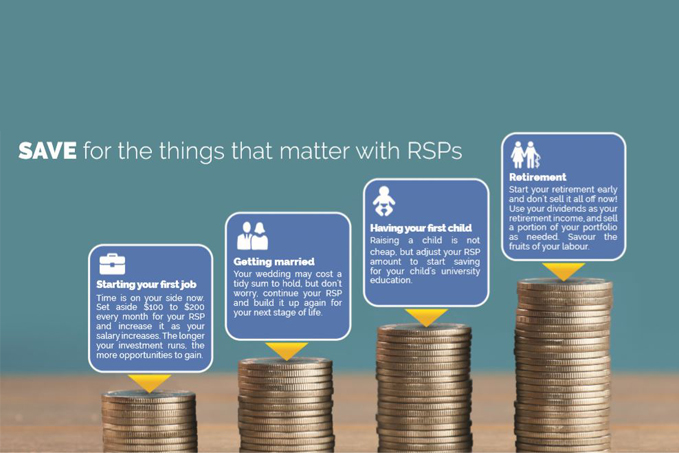5 things you need to know about Unit Trusts

Whenever we talk about investments, the most common words that come to mind are stocks, shares or bonds. What about unit trusts? You may have heard of them but do you know what they are and what it means for your investments? We have put up a quick guide for you to better understand what exactly are unit trusts and how you can include it as part of your investment portfolio.
So what in the world is a Unit Trust?
A unit trust pools investors’ money into a single fund, which is then managed by a professional fund manager2 according to the fund’s investment objective and investment approach. Unit trusts are usually set up under a trust deed1 where the investor is effectively the beneficiary under the trust. In Singapore, they are regulated as a form of collective investment.
The fund manager (or fund management company), buys securities2 such as stocks, bonds, cash equivalents and sometimes derivatives on behalf of the investors and combines them in a portfolio. The portfolio3 is then divided into many equal “units” where investors receives a certain number of units depending on how much he or she invest in the portfolio - hence the term “unit trust”, also known as “mutual funds”.
Why invest in unit trusts?
One of the key reason why people invest in unit trusts is because most of them do not have the expertise or do not want to worry about which shares to invest in3, so they hand the money over to a fund manager whose job is to research and decide which instruments will provide the best return over the next few years. Other advantages of investing in a unit trust compared to buying shares or bonds directly includes diversification, lower volatility and affordability. Investors can start buying unit trusts from as low as SGD$1,000.
What are the types of unit trust?
-
1. Fixed Income (Bond) Funds
Typically consists of debt instruments such as government bonds or corporate bonds that pays an interest (coupon) on a fixed schedule.
-
2. Equity (Stock) Funds
Generally invests in a portfolio of individual stocks with the goal of achieving capital growth. Equity funds typically carry a higher investment risk compared to Bond funds.
-
3. Balanced/Multi-asset Funds
Offers investors instant diversification across asset classes as Balanced funds consists of a mix of equity and fixed income securities.
-
4. Alternative Funds
Offers greater portfolio diversification through the use of sophisticated investment instruments and strategies such as Private Equity, Hedge Funds, Real Estate and Derivatives contracts etc. Due to the complex nature of these strategies, dollarDEX has taken effort to ensure that they are only available to customers who are Accredited Investors.
-
5. Passive Funds
Generally invests in component stocks of a benchmark index and do not require a fund manager to spend much time selecting the stocks. Some examples of benchmark index includes the US S&P 500 index or the STI index. Passive funds usually have a lower management fee since it requires less activity from the Fund Manager.
-
6. Money Market Funds
Money Market Funds (MMF) are open-ended unit trusts that invests in short-term and low-risk debt securities such as Government Treasury Bills and Commercial Paper. One example of such securities is the Public Utilities Board 3.9% 31/08/2018 where the PUB uses the proceeds to finance infrastructure works undertaken by the Singapore Government. MMFs are usually benchmarked against bank deposits as they seek to preserve capital while providing a higher yield. Learn more about MMFs here.
Do unit trusts pay dividends?
Yes, some unit trusts do distribute dividends on a monthly, quarterly, semi-annual or annual basis depending on the share class. You may search for the list of dividend paying funds on dollarDEX here.
What are the costs involved?
For the work that a professional fund manager performs on behalf of investors, the manager in turn charges a fee, also known as “Management Fee”. Fund Management Fee typically ranges between 0.5% - 2% per annum and the fund performance reflected on the Factsheets are usually net of such fees.
Also, depending on where you purchase your unit trust, a Sales Charge may apply. Such fees are usually meant to compensate the Bank or Financial Adviser for advice given and may range from 1% to 5% for each buy or switch transaction.
However, by investing on dollarDEX, you enjoy zero sales charge, platform fees and switching fees, so your money is fully invested. And we believe that your money deserves to work harder so that you can achieve your financial goals earlier.
Not convinced? Find out how we make money here.
Ways to invest in Unit Trusts
-
1. Investment method
Unit Trust investing offers lots of flexibility, including allowing investors to decide if they prefer to invest through Cash, CPF-OA, CPF-SA or SRS.
-
2. Start a Regular Savings Plan (RSP)
Contrary to popular belief, you do not need a huge capital to start investing, in fact through a Regular Savings Plan (RSP), investors can start building their portfolios from as low as $100 a month by leveraging on the Dollar Cost Averaging principle.
-
3. Model Portfolios
The biggest hurdle for most new investors is that they don’t know what funds to choose. Model portfolios leverages the Asset Allocation principle to provide investors with a combination of unit trusts to provide an expected return based on a given amount of risk.
At dollarDEX, we work with Morningstar, a leading investment research company, to create five model portfolios for investors with different risk profile.
Find out more about our model portfolios here.
Open an account and Kick start your investment journey with us today!
YOU MAY ALSO LIKE
1https://www.investopedia.com/terms/u/unittrust.asp
2https://en.wikipedia.org/wiki/Unit_trust
3https://mg.co.za/article/2010-07-19-what-is-a-unit-trust-and-how-do-you-invest
All information here is for GENERAL INFORMATION only and does not take into account the specific investment objectives, financial situation or needs of any specific person or groups of persons. Prospective investors are advised to read a fund prospectus carefully before applying for any shares/units in unit trusts. The value of the units and the income from them may fall as well as rise. Unit trusts are subject to investment risks, including the possible loss of the principal amount invested. Investors investing in funds denominated in non-local currencies should be aware of the risk of exchange rate fluctuations that may cause a loss of principal. Past performance is not indicative of future performance. dollarDEX is affiliated with Aviva but dollarDEX does not receive any preferential rates for Aviva products as a result of this relationship. Unit trusts are not bank deposits nor are they guaranteed or insured by dollarDEX. Some unit trusts may not be offered to citizens of certain countries such as United States. Information obtained from third party sources have not been verified and we do not represent or warrant its accuracy, correctness or completeness. We bear no responsibility or liability for any error, omission or inaccuracy or for any loss or damage suffered by you or a third party (including indirect, consequential or incidental damages) arising in any way from relying on this information.
This information does not constitute an offer or solicitation of an offer to buy or sell any shares/units.
This article has not been reviewed by the Monetary Authority of Singapore.
Information is correct as of 10/10/2018.




